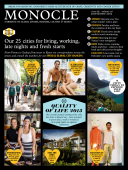
Issue 65
Our 25 cities for living, working, late nights and fresh starts. From Vienna to Sydney, Vancouver to Kyoto our correspondents survey the streets and crunch the numbers for our Special Global City Ranking.
In This Issue
Oops! No content was found.
Looks like we no longer have content for the page you're on. Perhaps try a search?
Return Home

